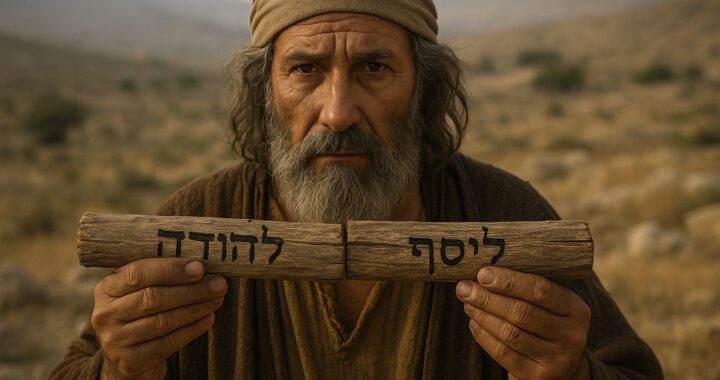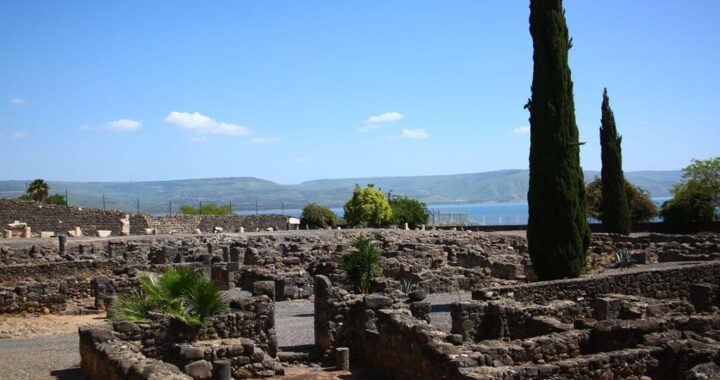The study of prophecy is always a favorite among believers. It is compelling and intriguing to see how prophets of God predict what will take place in the future. Fulfilled prophecy bolsters our faith and encourages us in the sovereignty of our great God. Only God has the omniscience to predict the future, and only God has the omnipotence to fulfill the prediction. Most prophecy in Scripture is directly tied to God’s plan and promises. This is the case with the prophecy found in Psalm 110.
Psalm 110 is a royal psalm. The royal psalms are a collection of psalms whose subject is the king of Israel. The background to all the royal psalms is the Davidic Covenant found in 2 Samuel 7. Through the prophet Nathan, God promised David that He would establish David’s dynasty forever (2 Sam. 7:12-14). God promised that one of David’s descendants would eternally sit on Israel’s throne. Psalm 110 builds upon this promise of God and provides further predictions as to how God will fulfill it. Psalm 110 proved immensely important for the early church as it is quoted or alluded to over thirty times by New Testament writers to demonstrate that Jesus is the Messiah. In fact, Psalm 110 is the most cited Old Testament passage in the New Testament.
Interpretive Issues with Psalm 110
Before we explore the predictions in Psalm 110, we need to explain two critical issues. First, who wrote the psalm? The authorship of Psalm 110 is critical for the proper interpretation. Though many modern interpreters doubt that David wrote the psalm, I believe that David is the author for these reasons. The first is the inscription of the psalm: “A Psalm of David.” While it is possible to translate this as “A Psalm to David,” the most common way to interpret the inscription is to understand David as the author. Second, Jesus affirmed that David was the author when questioning the Pharisees in the temple (Matt. 22:41-46; Mark 12:35-37; Luke 20:41-44). This statement by Jesus settles the matter for me.
The second critical issue in understanding Psalm 110 is determining the subject of the psalm. Is Psalm 110 Messianic, or is it about David’s immediate heir, Solomon? This issue is largely determined by the first line of the Psalm: “The LORD said to my Lord” (Psalm 110:1a). The speaker in this verse is God, designated by His personal name, Yahweh. Most of our English translations indicate this name of God with “Lord” (in all caps). The critical issue, however, is the identification of the referent to “my Lord.” The Hebrew word for “Lord” here is ʾădōnî. It usually refers to a human king or master in the Old Testament (in contrast to ʾădōnay, which always refers to God). 1
There are two schools of thought with conservative interpreters on the referent to “my Lord.” Some Bible scholars believe “my Lord” refers to Solomon, the immediate successor to the Davidic throne. This would mean that the primary subject of the psalm would be Solomon and his enthronement as Israel’s king (see 1 Kings 1). This line of interpretation culminates in a typological fulfillment with Jesus the Messiah as the last and ultimate son of David.2 While this school of thought is possible, I believe that it is better to see Psalm 110 as a direct prophecy about the Messiah. In this case, “my Lord” in verse one would only refer to the Messiah. In other words, Psalm 110 is an oracular revelation from God to David about the future Messiah.3 This will become clearer as we look at the specific predictions in the psalm.
What is shocking about this statement is that David called his descendant “my Lord.” Why would a king ever call his descendant Lord? Jesus picks up on this role reversal of authority in his debate with the Pharisees (Matt. 22:41-46; Mark 12:35-37; Luke 20:41-44). The opponents correctly identify the Messiah as the Son of David but cannot answer why David calls his descendant “Lord.” The implications are clear: Jesus is the Messiah, and Jesus is greater than David.
The Prophecies in Psalm 110
Psalm 110 contains two oracles or divine declarations by God. The first oracle is found in verse one: “Sit thou at my right hand, Until I make thine enemies thy footstool.” This is a kingly pronouncement for the Messiah to sit at God’s right side. The right side was a place of honor and respect in ancient Near Eastern cultures (e.g., 1 Kings 2:19). In the case of Psalm 110:1, it is also a place of elevated authority. Two shocking facts emerge from this oracle. First, the future Messiah will rule with God as His coregent. The authority and rule of the Messiah is unparalleled by any standard of earthly kings, even that of David himself. The extent of the authority of the Messiah will encompass all the nations (see Psalm 110:2-3, 5-6; Psalm 2:7-9). Second, God will subdue all the enemies of the Messiah sometime after he is exalted. So, the exaltation of the Messiah to the throne of God precedes the defeat of his enemies. Normally just the opposite would be expected—exaltation would follow victory.
The second oracle is found in verse four: “The LORD hath sworn, and will not repent, Thou art a priest for ever after the order of Melchizedek.” This is a priestly pronouncement that is enhanced as a divine oath. God revealed more shocking details about the future Messiah. First, the king of Israel will also be a priest. Under Mosaic Law, the Levitical priests exclusively administered all the sacrifices and temple worship in Israel. I think this is another clear reason why Psalm 110 is Messianic and not merely typical of all of David’s successors. Because David was from the tribe of Judah, he and all his descendants could not function as king-priests under Mosaic Law. Second, we learn that the Messiah will serve as a priest under a new priestly order—the king-priest Melchizedek. Melchizedek was both the King of Salem (i.e., Jerusalem) and “the priest of the most high God” (Gen. 14:18). He received tithes from Abraham and blessed him in Genesis 14. Third, this oracle reveals that the Messiah will serve as a priest eternally. I believe that Melchizedek serves as a type of Christ, as explained in Hebrews 5 and 7. Only the Messiah could fulfill this eternal expectation outside of the Mosaic Covenant and under the terms of the New Covenant.
The Fulfillment of Psalm 110
Allen Ross succinctly summarizes the prophetic nature of Psalm 110: “This marvelous psalm is a prophecy of the coming victory of the Messiah over the world.”4
So how and when are these prophecies fulfilled? Several layers of fulfillment emerge in Scripture. First, part of the prophecy of Psalm 110 was fulfilled in conjunction with Jesus’ first advent. The New Testament writers repeatedly identified Jesus as the Messiah based on Psalm 110:1. Jesus was the ultimate Son of David who was also David’s Lord (Matt. 22:41-46). In addition, the New Testament clearly sees the resurrection and ascension of Jesus as a fulfillment of Psalm 110:1 (Eph. 1:20-23; Col. 3:1; 1 Peter 3:20-21). Consider Peter’s sermon in Acts 2 on the Day of Pentecost. After explaining Jesus’ resurrection and ascension, Peter cites Psalm 110:1 as evidence that Jesus has been exalted to God’s right hand:
33 Therefore being by the right hand of God exalted, and having received of the Father the promise of the Holy Ghost, he hath shed forth this, which ye now see and hear. 34 For David is not ascended into the heavens: but he saith himself, The LORD said unto my Lord, Sit thou on my right hand, 35 Until I make thy foes thy footstool. 36 Therefore let all the house of Israel know assuredly, that God hath made that same Jesus, whom ye have crucified, both Lord and Christ (Acts 2:33-36).
Theologically this is known as the session of Jesus, which completed his exaltation to God’s right side. The authority entrusted to Jesus at his session empowers the church to fulfill the Great Commission (Matt. 28:18-20). Another fulfillment in conjunction with Jesus’ first advent is the priestly office of Jesus. In Hebrews 5:6-10 and 7:1-28, the author of Hebrews explains that Jesus is a priest according to the order of Melchizedek and is perpetually and eternally serving as believers’ High Priest. Therefore Psalm 110:4 anticipates the redemptive nature of Jesus’ first coming and the on-going intercession of the Messiah. As King, Jesus rules with authority and justice; as Priest, he saves and sanctifies.
The second layer of fulfillment of Psalm 110 is yet to come in conjunction with Jesus’ second advent. While God exalted Christ to His right hand at the ascension, God has not yet defeated His enemies. Hebrews 10:12, 13 and 1 Corinthians 15:24-28 make this clear. God will defeat His enemies initially at Christ’s return, and Christ will establish His millennial reign in Zion (Psalm 110:2, 3; see Zechariah 14). Yet God will continue to subdue His enemies throughout the kingdom as Christ rules in the midst of His enemies (Psalm 110:2).
The final layer of fulfillment will occur at the end of the Millennium, as Satan rallies the nations in one final rebellion against God (Rev. 20:3, 7-10). Psalm 110:5-6 alludes to this violent and ultimate defeat of all of God’s enemies. Interestingly the Psalm ends with the picture of peaceful restoration and final exaltation of the Messiah (Psalm 110:7). At the outset of Eternity, God will rule over all creation having vanquished every enemy.
Five Shocking Prophecies of Psalm 110
- The Messiah would be both David’s Son and Lord (Psalm 110:1a).
- The Messiah would be exalted before victory (Psalm 110:1b).
- The Messiah would be invited to sit at God’s right side (Psalm 110:1b).
- The Messiah would be also an eternal High Priest (Psalm 110:4).
- The Messiah would secure victory over enemies in stages (Psalm 110:2-3, 5-7).
This article first appeared in Frontline Magazine, May/June of 2022. Used with permission.
Works Cited- Alden, Robert L., “אדן,” ed. R. Laird Harris, Gleason L. Archer Jr., and Bruce K. Waltke, Theological Wordbook of the Old Testament (Chicago: Moody Press, 1999), 13.[↩]
- See e.g., Gordon H. Johnston, “Messianic Trajectories in the Royal Psalms,” in Jesus the Messiah: Tracing the Promises, Expectations, and Coming of Israel’s King (Grand Rapids, MI: Kregel Academic, 2012), 91-100.[↩]
- See e.g., Michael R. Rydelnik, “Psalm 110: The Messiah as Eternal King Priest,” in The Moody Handbook of Messianic Prophecy: Studies and Expositions of the Messiah in the Old Testament (Chicago: Moody Publishers, 2019), 673-91.[↩]
- Allen P. Ross, A Commentary on the Psalms (90–150). Vol. 3, Kregel Exegetical Library (Grand Rapids, MI: Kregel Academic, 2016), 358.[↩]

Dr. Douglas Brown
Dr. Douglas Brown is the Academic Dean of Faith Baptist Theological Seminary and a senior professor within the seminary. Dr. Brown received his Bachelor of Arts and Master of Arts from Faith Baptist Bible College and Theological Seminary, his Master of Divinity from Central Baptist Seminary, and Ph.D. from Trinity Evangelical Divinity School. Dr. Brown has many years of experience as a youth pastor and assistant pastor in Iowa, Minnesota, and Illinois. He is an avid golfer and enjoys traveling. He and his wife, Tricia, live in Ankeny and have four children, two of whom attend Faith Baptist Bible College and Theological Seminary.

Dr. Douglas Brown
Dr. Douglas Brown is the Academic Dean of Faith Baptist Theological Seminary and a senior professor within the seminary. Dr. Brown received his Bachelor of Arts and Master of Arts from Faith Baptist Bible College and Theological Seminary, his Master of Divinity from Central Baptist Seminary, and Ph.D. from Trinity Evangelical Divinity School. Dr. Brown has many years of experience as a youth pastor and assistant pastor in Iowa, Minnesota, and Illinois. He is an avid golfer and enjoys traveling. He and his wife, Tricia, live in Ankeny and have four children, two of whom attend Faith Baptist Bible College and Theological Seminary.



